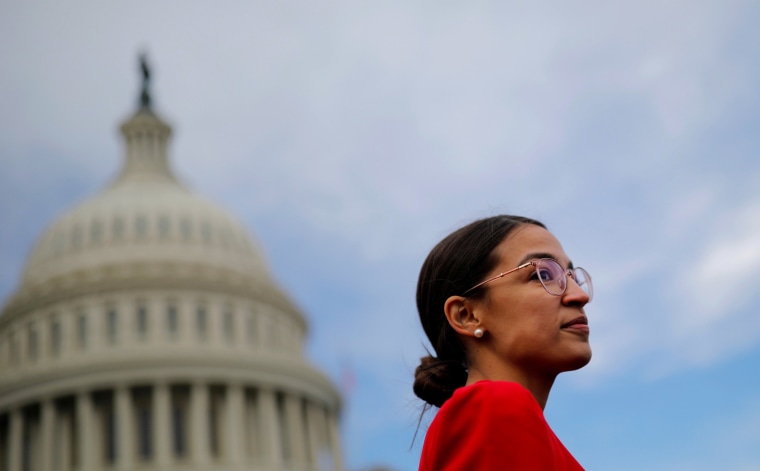WASHINGTON — Rep.-elect Alexandria Ocasio-Cortez, D-N.Y., is calling on lawmakers to increase salaries for congressional staffers and to pay their interns.
The newly elected New York Democrat Socialist tweeted Monday that she went to a dive bar in Washington this week and spoken to bartenders, managers and servers who also work on Capitol Hill, suggesting that they shouldn’t have to juggle two jobs.
Ocasio-Cortez, 29, said it was “unjust” for Congress to pay lawmakers a living wage but rely on “unpaid interns” and “underpaid overworked staff.” She said that Congress should increase the Members’ Representational Allowance for all lawmakers.
She and other members of Congress will already have fresh resources to pay interns, thanks to a new repository of funding.
A mini-spending package passed by Congress and signed into law by President Donald Trump in September included new funding for members of Congress to draw on to pay their interns. The 2019 Legislative Branch bill includes $8.8 million for the paid internships in the House, allowing for up to $20,000 per calendar year for each House member to pay their interns. The bill, meanwhile, allocates $5 million for paid internships in the Senate.
The money is already available to offices now, according to Jennifer Hing, spokeswoman to Republicans on the House Appropriations Committee.
“A congressional internship offers an entrance to a career in public service, but many dedicated, young adults do not have the means to spend a summer working for free in Washington or in our home districts,” Sen. Patrick Leahy, D-Vt., ranking member on the Senate Appropriations Committee, said in September. “By paying interns for their work, we open the door to a wider and more diverse pool of applicants looking to serve their country.”
A 2017 report found that only 8 percent of GOP lawmakers in the House paid their interns, as did only 3.6 percent of Democratic House members, according to Pay Our Interns, a bipartisan, nonprofit organization that advocates an increase in paid government internships. The group found that in the Senate, members either paid their interns, offered stipends or had pledged to start paying.
The group discovered an ad Monday for an unpaid internship in the office of Senate Minority Leader Chuck Schumer, D-N.Y., according to Rolling Stone, but a spokesman for the senator told the magazine that it was “made in error” and that Schumer’s office will “offer a stipend to eligible interns” starting in January.
Before the passage of the latest appropriations bill, the House had previously offered some paid internships through the Lyndon Baines Johnson Congressional Intern Program, which operated from 1973 until 1994.
Lawmakers are paid $174,000 a year, and the total budget allowance for each member's staff in 2017 was $944,671.
The legislation does not require lawmakers to pay their interns, but the newly allotted funds can only be used for that purpose.

